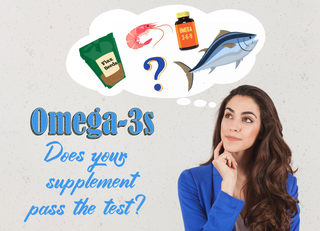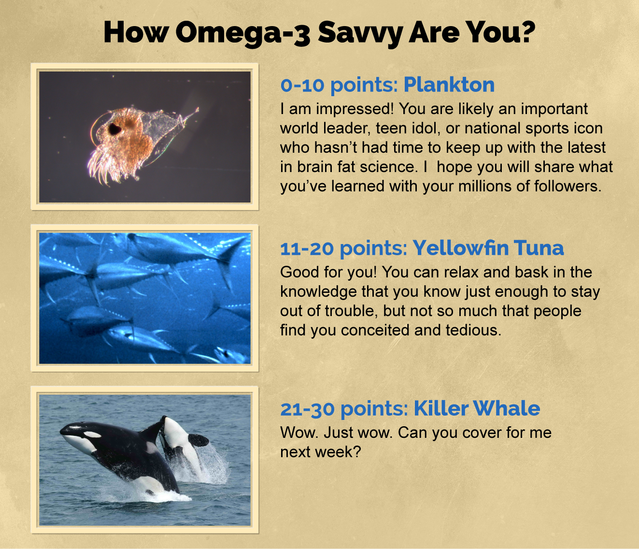Omega-3
Put Your Omega-3 Supplement to the Test
So a salmon, a krill and a flax seed walk into a bar...
Posted March 31, 2017

We’ve all heard that omega-3s are essential to brain health. But how much do you actually know about that expensive supplement you (try to remember to) take every day? Do you really need it? Are you taking the correct dose? Did you buy the best kind?
Omega-3s are confusing. When you’re standing in the supplement aisle facing dozens of choices, how are you supposed to know which one is right for you? It’s tricky, because the answer depends on source, supplement quality, ingredient ratios, and most importantly, what you eat.
To make this important information easier to swallow, I’ve created two quizzes to test your omega-3 IQ, which I hope you’ll enjoy enough to share with your friends and family. The one below is all about omega-3 supplements, and a sister quiz, which you can access here, is all about natural food sources of omega-3s and how they work in the body. I've included a quick summary and a link to specific product recommendations at the end of the quiz.
1. Who absolutely MUST take an omega-3 supplement? (select all that apply)
a) Vegans
b) Lacto-ovo Vegetarians
c) People who don’t eat seafood
d) Everyone must take a supplement
e) People who own stock in supplement companies must take a supplement
ANSWER: (a) Plant foods do not contain any EPA or DHA, the active forms of omega-3s our bodies use. The only form of omega-3 found in plants is called ALA, and it is extremely difficult for our bodies to transform ALA into EPA and DHA. Therefore, vegans MUST take a supplement.
b) Eggs and dairy are quite low in EPA and DHA, even if they come from pastured animals, so vegetarians would be wise to take a supplement, but it's unclear if it's mandatory for all vegetarians.
c/d) You don't have to eat seafood or take supplements because there are other foods that contain omega-3s (see companion quiz here for more information).
2. Which mental health problems might improve if you take omega-3s? (select all that apply)
a) Alzheimer’s Disease
b) Early Psychosis
c) Depression, including Bipolar Depression
d) OCD
e) ADHD
f) PPPD (Prominent Politician Personality Disorder)
ANSWER: (a, b, c & e) The strongest evidence is in people in the early stages of psychosis, but there is some evidence to suggest that omega-3 supplements can also be helpful with depression, dementia, and ADHD. There is no evidence that omega-3s can help with OCD, although it certainly can't hurt.
3. Which form of omega-3 is best for the brain? (select one)
a) ALA
b) DHA
c) EPA
d) DOA
e) PGA
ANSWER: (c) There are 3 forms of omega-3: ALA, EPA and DHA. The active forms our brains use are EPA and DHA. Scientific studies of omega-3 supplements generally find that EPA is superior to DHA when it comes to brain health, and that ALA supplements are not effective.
4. What daily dose of omega-3 is recommended for optimal brain health, particularly in people with mental health problems? (select one)
a) 400 mg of ALA
b) 1000 mg of EPA
c) 6000 mg of DHA
d) 100 gigabytes of RAM
e) 1/2 gallon of IPA
ANSWER: (b) Recommendations vary from 400 to 2000 mg per day of combined EPA and DHA, but supplements containing an average of about 1000 mg per day of EPA worked best in most mental health studies. I believe it is possible that the recommended dose of omega-3s may be inflated due to the fact that studies are conducted on people who are likely consuming a great deal of omega-6 in their usual diet (see question 8).
5. How does krill oil compare to fish oil? (Select all true statements)
a) Krill oil contains a powerful pink antioxidant
b) Per dose, krill oil costs less than fish oil
c) Krill oil is suitable for vegetarians and vegans
d) Krill are cuter than fish and make better pets
ANSWER: (a) and (d)
a) True. Krill oil contains astaxanthin, a natural red compound with antioxidant properties. The amount of astaxanthin in krill supplements is much lower than the doses used in studies that attempt to show health benefits in humans, so it is unlikely to provide any special protection from aging, cancer, or other disease. All we can say with certainty is that this potent pink molecule prevents the krill oil supplement itself from oxidizing (turning rancid).
b) False. The omega-3s in krill oil MIGHT be a LITTLE easier to absorb, but they are far less concentrated compared to fish oil, so you have to take a lot more krill oil to reach the recommended daily dosage. This means you can end up paying up to 10 times more per dose for krill oil!
c) False. Krill oil comes from tiny, shrimp-like sea creatures. No self-respecting vegan wants to see one of these bad boys swimming in their kale smoothie.
d) True. Krill are cuter and do make better pets. (Note: the opinion expressed in this answer is that of the author only and does not necessarily reflect that of Psychology Today.)
6. Which omega-3 source is, by FAR, best for vegetarians and vegans? (select one)
a) Chia seeds
b) Krill oil
c) Flaxseed oil
d) Algae oil
e) Fish oil
f) Oil of Olay
ANSWER: (d) Algae oil is the only non-animal source of EPA and DHA—the forms of omega-3 our bodies require. Plant foods contain absolutely no EPA or DHA. Plant sources of omega-3s only contain ALA, which is extremely difficult for our bodies to use.
7. Can you overdose on omega-3? (choose all that apply)
a) No, you can never have too much of a good thing
b) Yes, if you take too much omega-3 you may have bruising and bleeding problems
c) Yes, if you take too much omega-3 you can have trouble dealing with infections
d) Yes, if you take too much omega-3 you may not be able to afford your rent
ANSWER: (b, c & d) It is possible to overdo it. At daily doses higher than 6000 mg of combined EPA/DHA, omega-3 supplements may increase risk for easy bruising/bleeding and impaired immune system function.
8. Which foods in your diet are working AGAINST your omega-3 supplement? (select all that apply)
a) Soybean oil, corn oil and sunflower oil
b) Butter, lard and bacon fat
c) Fruit juice, Fluffernutters and Frosted Flakes
d) Swordfish, sawfish, hammerhead shark (and any other fish with a tool for a head)
ANSWER: (a & c) Refined seed oils are extremely, unnaturally high in omega-6 fatty acids, which compete with omega-3s inside your body.
Foods high in refined carbohydrates such as sugar and flour are powerful promoters of inflammation, which work against the anti-inflammatory forces of your omega-3 supplement. It's like that classic Steven Wright joke about putting a humidifier and a de-humidifier in the same room and letting them fight it out...In fact, I believe it is possible that the recommended dose of omega-3s may be inflated due to the fact that studies are conducted on people who are likely consuming a great deal of omega-6 in their usual diet.
9. Should you also take an omega-6 or omega-9 supplement? (select one)
a) Yes, omega fatty acids need to be in balance, so you have to take omega-3, 6, and 9 together
b) You have to take omega-6 but not omega-9, because omega-6s are essential just like omega-3s
c) You have to take omega-9 but not omega-6, because our diet already contains too much omega-6
d) No, you don’t have to take omega-6 or omega-9—just omega-3
e) You actually have to take ALL of the omegas, 1 through 10, but 1, 2, 4, 5, 7, and 8 are rare and expensive, so only rich people get to be completely healthy
ANSWER: (d) NOBODY needs to worry about omega-6 deficiency or omega-9 deficiency. Yes, omega-6s ARE essential, just like omega-3s, but omega-6 fats are widespread in plant and animal fats, whereas omega-3s are scarce in the standard Western diet. To make matters worse, omega-6s work AGAINST omega-3s, reducing their effectiveness. As for omega-9s, our bodies make omega-9s themselves, so they are not essential. Do NOT waste money on omega-6 or omega-9 supplements!
10. Are omega-3s safe for everyone? (Select all that are true)
a) Fish oil and krill oil almost always trigger bad reactions in people who have fish or shellfish allergies
b) People with serious bleeding disorders or who take the potent blood thinner Coumadin (Warfarin) may not be able to take omega-3 supplements
c) People who take common anti-inflammatories like Aspirin, Plavix (Clopedigrel) or NSAIDs (Advil/Motrin/Ibuprofen, Aleve/Naprosyn/Naproxen, etc.) should not take omega-3 supplements because of increased risk of bleeding
d) Pregnant women shouldn’t take fish oil because it is high in mercury
e) People suffering from deep-seated fears of sea creatures due to traumatic childhood maritime experiences should avoid omega-3 supplements
ANSWER: (b) and (e)
a) False. Fish and krill oil are purified and therefore virtually free of proteins that can trigger allergies. Most people who are allergic to fish or shellfish probably would be fine with these oils. Still, even though the risk is extremely small, keep that Epi pen handy the first time you try a new brand, or shell out the extra dough for algae oil.
b) True. Omega-3s can theoretically increase risk for bleeding, so in these special circumstances, you should consult with your physician.
c) False. Contrary to popular belief, studies show that it is safe to consume omega-3s even if you're taking anti-inflammatory medicines that can increase your risk for bleeding. [Wachira AK et al British Journal of Nutrition (2014), 111, 1652–1662]
d) False. Omega-3 supplements are purified and virtually free of mercury, PCBs and other contaminants.
e) True. Have a heart, people.
SCORE: So, what's your omega-3 IQ?
Multiply the number of correct answers by 3 to find your omega-3 supplement IQ.

Summary: What you need to know before you buy
1. Unless your diet is rich in natural animal fats and very low in seed oils, I recommend you take an omega-3 supplement. If you take warfarin/coumadin, have a bleeding disorder, consult with your physician first. If you are allergic to fish or shellfish, choose an algae oil supplement or consult with your physician first. Otherwise, omega-3 supplements are safe, even for pregnant women.
2. The recommend dosage per day ranges from 400 to 2000 mg of combined EPA/DHA per day, but in mental health studies the average recommended dose per day is 1000 mg of EPA. Read labels to see how many pills or teaspoons you need to take to equal about 1000 mg.
3. Check the label to see what form of oil is inside--esters are poorly absorbed, so choose a supplement that is in triglyceride or phospholipid form, not ester form.
4. The ONLY supplement source worth your money if you eat a vegetarian or vegan diet is algae oil.
5. Krill oil possesses no special properties compared to fish oil and is much more expensive per dose. Do NOT waste your money on omega-6 or omega-9 ingredients.
For my specific supplement product recommendations, please see my complete article all about fats.
Still hankering for more information about omega-3s? See my companion quiz on Psychology Today about how to obtain omega-3s from your diet instead of from supplements, and see if you know the answers to these and other burning questions:
- Why does the brain need omega-3s?
- Which oils are highest in omega-6?
- Does wild salmon have more omega-3 than farmed salmon?
- Does grass-fed beef actually have more omega-3 than grain-fed beef?
- How do vegans, vegetarians and omnivores compare when it comes to omega-3 levels?
I'm happy to answer additional questions below in the comments section, too!




